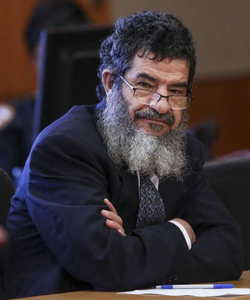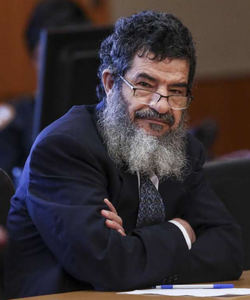Ali Mahwood-Awad Irsan

Ali Mahwood-Awad Irsan

Irsan and his son pray at Reliant Center Hall A on Dec. 6, 2002, to observe the end of Ramadan and the beginning of Eid al-Fitr
Ali Mahwood-Awad Irsan is convicted felon originally from Jordan who resides in Montgomery County, Texas. In August 2018 he was sentenced to death for committing two honor killings in 2012 that were part of a plot to kill five people, including his daughter, in retribution for her leaving home, converting to Christianity and marrying a Christian.
Personal Life

Ali Mahwood-Awad Irsan sits in the courtroom before the start of testimony from witnesses in his capital murder trial at the Harris County Civil Courthouse Thursday Aug. 9, 2018
Ali Mahwood-Awad Irsan immigrated to the United States from Jordan in 1979 and later became a naturalized US citizen. He is a devout Muslim and a father of 12. Isran and his wife Shmou Alrawabdeh lived with their children in rural Montgomery County, Texas. He previously married a blind woman from Iowa in 1999 after allegedly raping her.
During the trial, Ali Mahwood-Awad Irsan spoke about how he grew up in a war zone in Jordan with an abusive father.
“I decided I would rather live in hell than live with that man,” Irsan said of growing up with his abusive father.
“I took 120 Aspirin pills to kill myself.” His brother found him and took him to a hospital to get his stomach pumped.
Criminal History

Coty Beavers, 28, was killed by Ali Mahmood-Awad Irsan.

Opening statements begin in trial for honor killing case

Nesreen Irsan the 30-year-old daughter of Ali Mahwood-Awad Irsan testified against him after he killed her husband and best friend.

Ali Mahwood-Awad Irsan in court on Thursday, April 30, 2015

Ali Mahwood-Awad Irsan is shown in court on Monday, June 25, 2018 in Houston holding a paper written in Arabic and colored with orange marker of the mantra, "There is no god but God and Mohammad is God's Prophet."
On Tuesday, August 14, 2018 Ali Mahwood-Awad Irsan was sentenced to death for committing the honor killings of his daughter's husband and an Iranian women's rights activist in Texas. The two killings were part of a plot to kill five people including his daughter, in retribution for her leaving home, converting to Christianity and marrying a Christian. He had been convicted of two counts of capital murder on July 26, 2018.
Ali Mahwood-Awad Irsan slumped slightly when the verdict was read, but did not react otherwise.
The trial judge praised the jury’s verdict. “Don’t second guess yourselves,” state District Judge Jan Krocker told jurors. “You listened attentively to every detail. It was the right verdict.”
Jurors sat through seven weeks of testimony about Irsan’s rage and desire to “wash his honor in blood,” quickly convicting Irsan of the capital murder of his daughter's new husband, Coty Beavers, 28, and her best friend, Gelareh Bagherzadeh, 30, an Iranian activist and medical researcher who supporter her choice.
Families of the victims cried, hugged and took pictures together after Irsan was led out of the courtroom in a yellow jail uniform.
“Adios,” one family member said from the gallery.
Almost an hour after the verdict was read, four women and three men from the jury came back to the courtroom to hug the surviving family members of Irsan’s victims. In tears, they introduced themselves and spoke quietly. They said it was tough decision, but they hope the families can now have peace.
Immediately after Krocker sentenced Irsan to death, he had to sit and listen as Beavers’ mother gave a victim impact statement, from the witness stand, with two of her sons standing next to her. “On November 12, 2012, Ali Irsan and his family destroyed life as we knew it forever,” said Shirley McCormick. “That was the day they ambushed and murdered Coty, to restore honor to someone who never had any.”
Afterward, Coty Beavers’ twin brother said the family would focus on the remaining suspects: Irsan’s adult son, Nasim, who is charged with capital murder, and his adult daughter, Nadia, who is charged with stalking. “Honor violence typically involves participation of multiple family members,” said Cory Beavers. “We will continue to pray that everyone culpable in these murders are brought to justice.”
Bagherzedeh’s parents, who attended every day of trial, asked family friend Kathy Soltani to speak for them.
“By taking Gelareh away from us, they took away a true human being who would have helped anyone in any way that crossed her path throughout her life,” Soltani said.
“They took something good from our society.”
Defense lawyers for Irsan said they were disappointed in the verdict and noted that it would automatically be appealed. “We will just leave it in God’s hands,” said lead attorney, Allan Tanner who represented Irsan with Rudy Duarte.
From the beginning of the trial, prosecutors said Irsan was hellbent on punishing his daughter and anyone who supported her break from the family. "He wanted to kill her," prosecutor Jon Stephenson told jurors during his opening statements. "But he wanted to kill all those she loved first, so that she would suffer that much more before she died."
Stephenson was appointed special prosecutor along with Anna Emmons and Marie Primm after Harris County District Attorney Kim Ogg recused her office. One of her top staffers represented one of the suspects in the multi-defendant case before joining the district attorney’s office. It is the first death penalty trial that has taken place since Ogg took office on January 1, 2017.
During the trial, some of Irsan’s family testified they lived in fear of daily beatings, including with a length of garden hose and “sticks” like Irsan’s cane and two-by-four boards. Two of his sons said that was not true.
One of Irsan’s daughters also testified that he cheered the 9/11 attacks on America and praised Osama bin Laden, and told his children they should volunteer to become suicide bombers.
For eight weeks, prosecutors put on evidence that Irsan had been a violent offender with a history of frauds since coming to America in 1979.
“He will lie, cheat, steal manipulate, abuse, torture, stalk and kill to get what he wants,” Emmons said during closing arguments.
She pointed to allegations that he raped his first wife, a blind woman he met in Iowa, then manipulated her into marriage.
There were also allegations that he raped his oldest daughter and tried to kill her because she married a man Irsan did not approve of in 1999.
Special prosecutor Marie Primm weaved together more than 20 years of Irsan’s bad acts to sway jurors against letting Irsan serve life without parole in general population in prison. She reminded the jury that Irsan also killed a different son-in-law in 1999.
“Ali Irsan gets the be the judge, jury and executioner of anyone who goes outside of Ali Irsan’s control.”
she said.
In 2015, Irsan, his wife and another daughter were sentenced to federal prison for defrauding the Social Security system, one of several schemes revealed during the trial that showed how Irsan financed trips back to Jordan and purchases of properties he acquired in Montgomery County.
For example, he apparently often claimed that he lost baggage during flights and was able to obtain reimbursements from airlines for laptops, other electronics and lost time. Those claims, prosecutors said, financed each trip.
He also convinced his mosque that he was renting his home and needed help paying rent and for electricity bills. That scam ended when elders at the mosque learned that his “landlord” was really his wife, testimony showed.
Prosecutors showed that he also opened dozens of credit card accounts in different names, including the names of deceased family members, to pay his bills. One such account, opened under his daughter’s name, went unpaid without her knowledge ruining her credit score, testimony showed.
The prosecution was also able to show that he bilked thousands of dollars out of large corporations by claiming slip and falls in big department stores, or by faking injuries and then threatening lawsuits for product liability.
In addition to those scams, he also got food stamps, Medicaid and took advantage of other social safety nets by forcing family members to fake mental illness to receive disability payments. Irsan testified that he has been disabled and unable to work since at least 1993, despite testimony that he cleared the land on his property and built fences by hand.
In 2014, a SWAT team swarmed Irsan’s Montgomery County compound and arrested him for Social Security fraud. State prosecutors later charged Irsan and his son, Nasim Irsan, 24, with capital murder. His trial is scheduled for next year.
Despite lengthy testimony over five weeks, jurors deliberated for less than an hour to convict Irsan of capital murder in July 2018.
The same jury then spent two weeks listening to testimony to determine whether Irsan should be sentenced to death or life without parole.
To sentence Irsan to die, jurors had to decide he would be a “future danger” to society and there were not enough mitigating circumstances to spare his life.







